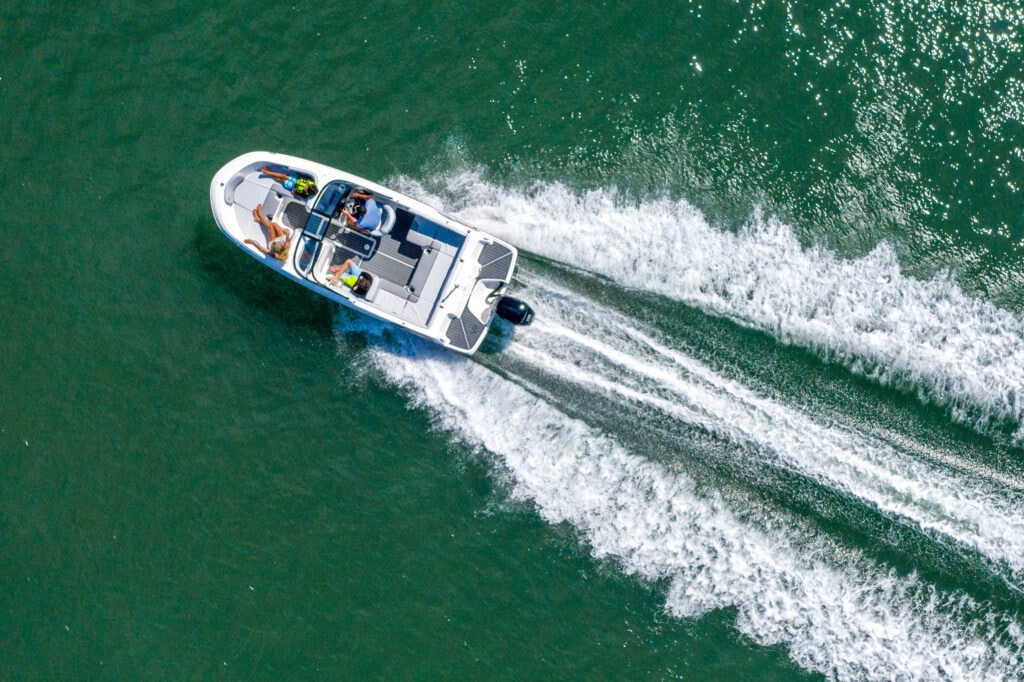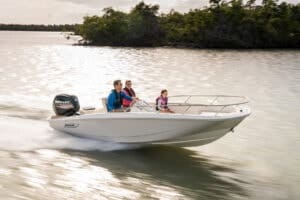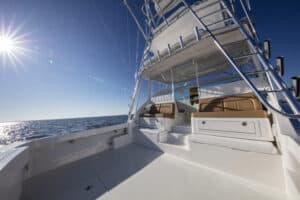You know you want to be a part of the fabulous boating community, and you can’t wait to get out on the water and enjoy some sunshine, balmy breezes, and quality time in the great outdoors. You may even be counting down the days until you can go deep sea fishing, water skiing, or wakeboarding. Or you may just want to lie back and enjoy a comfy lounge chair on the bow while you slowly cruise down the canal with a cold drink in one hand and a delicious snack in the other.
No matter what your boating style is, buying a boat can be a bit overwhelming, especially if you’re new to the boat world. There are so many things to consider and so much to do from the time you decide you want to purchase a boat until the time that the boat actually belongs to you. If you’re ready to set sail, learn how we do boat loans at Trident Funding.
We not only help you find a way to pay for the boat: a boat loan with a marine financing specialist, but we also walk you through the entire process of buying a boat. If you don’t know what your price range is, check out our free online boat loan calculator, and then contact us to get started applying for a boat loan. Ready to see rates? Check boat loan rates here. The faster you get your financing lined up, the faster you can enjoy your new boat.
How to Choose a Boat?
1. Your Budget
2. Your Lifestyle
3. The Best Use of the Boat
4. Durability and Functionality of the Boat
How to choose a boat can seem like a daunting question because there are so many different types of boats at various price points. There are boats for almost every budget, lifestyle, and use. When choosing a boat, you want to consider the following factors: your budget, your lifestyle, the best use of the boat, and the durability, and functionality of the boat.
Your Budget
When it comes to the commonly asked question of ‘How to choose a boat?’ your budget should be the most important deciding factor. You want to make sure that you can afford to not just pay for the boat, but maintain it, insure it, store it, clean it, and so on. Boats create ongoing expenses and aren’t just a one-time cost.
If you’re on a fairly tight budget, only want a small boat, or want to buy a starter boat to learn on, then consider a center console boat, a deck boat, or a jet boat. These boats vary greatly in price depending on their size, condition, and features, but you may be able to find a pre-owned center console boat for as little as $30,000. Preowned basic deck boats also start around $30,000 and newer models with full features such as extended swim platforms, extra cup holders, and electronic bimini tops can go up to about $250,000. Jet boats are also reasonably priced and typically range from about $25,000 to $150,000.
If you don’t have to stick to a budget, are an experienced boater, or want a special-purpose boat, you may be interested in a sailboat, a yacht, or even a high performance powerboat. Sailboats range from small catamarans for tens of thousands of dollars to sailing yachts which can sell for millions of dollars.
Yachts are large, luxurious, and are often used for multiple day vacations, may have room for crew quarters, and some can even store jet skis. Yacht prices typically range from $250,000 to hundreds of millions of dollars for a super yacht or a mega yacht. High performance powerboats are used for speed, often for racing, and usually have multiple engines with lots of horsepower. They typically sell for $150,000 to over $2 million.
If you want an estimate of your monthly boat loan payment, check out Trident Funding’s boat loan calculator. It can help you figure out how much boat you can afford to buy. Don’t forget to add in extra insurance and marina costs.
Your Lifestyle
Another big factor when deciding how to choose a boat is what kind of lifestyle you lead and/or plan on leading. Consider things like how much free time you will have to use your boat, where you plan on boating, and how many people will be on board. Other things to think about include if you’re going to use the boat for pleasure, for watersports, for fishing, or as a business.
A retired couple who want to use the boat for extended periods of time will have different boating needs than a large family who wants to spend a few days a month enjoying activities on the water. Jet boats are typically on the smaller side and usually range from 15 to 28 feet long. They’re great for smaller groups of people, watersports, and visiting local attractions, but aren’t ideal for larger families, hosting events, or entertaining on the water.
Conversely, yachts are large, generally over 45 feet long and are ideal for more people, as well as accommodating overnight guests, and a crew to assist you. However, yachts can’t go in shallow water, may not be able to dock everywhere, and aren’t ideal for canals or smaller bodies of water.
If you want something not too big and not too small, consider a cabin cruiser or a deck boat. Cabin cruisers are set up like small yachts and usually range from about 25 to 45 feet. They can cruise for long distances and have below-deck cabin quarters which can be used for sleeping, hanging out, or storage. Deck boats are also medium sized, generally ranging from 20 to 30 feet, but are more intended for day trips. They’re a popular boat for watersports, for entertaining a few friends, and for sunbathing and docking at local waterfront restaurants.
The Best Use of the Boat
Once you know your budget and assess your boating lifestyle, you will want to learn more about the boat’s best or intended use. Some pontoon boats aren’t intended for saltwater because they will rust, but they’re ideal for hanging out in the lake or river. Not all boats are good for taking out in the ocean; rough waters can easily capsize them, and they don’t have the speed or capacity to take on large waves. Basically, if your boat doesn’t have a V-shaped hull, it shouldn’t be taken into the ocean.
Center console boats are ideal for fishing and new models often include coolers, fishing rod holders, and plenty of storage compartments. However, if you want to grill on board, enjoy cocktails or sunbathe, they may not be the best option due to their layout. A yacht or deck boat will have more comfortable space for relaxing and chatting.
Durability and Functionality of the Boat
When thinking about how to choose a boat, you should also consider the boat’s functionality and durability. How long will the boat last? What are its functions? What can’t it do? You may want to buy a new boat or one with less hours to ensure durability and modern features. Check out online reviews of the manufacturer, the specific model, and the boat dealer. Keep in mind your lifestyle and the boat’s intended use. A boat may be very durable if kept in freshwater, but may deteriorate in saltwater. In general, fiberglass boats tend to be durable and last a long time if properly cared for.
When it comes to functionality, think about if the boat is solely wind-powered (a sailboat) or if the boat will be used to transport passengers from a yacht to shore. Or, if you want to race, you will care about how many engines the boat has, the types of engines, and the horsepower of the boat. However, if you just want to relax onboard, you will care more about the layout and convenient features like a fridge, built-in grill, cupholders, and a head.
How to Choose a Boat: The Wrap Up
When choosing a boat, try not to get overwhelmed by all the latest and greatest features, new makes, models, and all the different types of boats. Instead, focus on functionality, durability, and your budget. Keep your lifestyle in mind, how frequently you plan on using the boat, and what the boat’s intended use is. If you have any questions or need guidance on paying for a boat, contact Trident Funding. We can walk you through the entire purchase process.
Frequently Asked Questions on How to Choose a Boat
What is the Lifespan of a Boat?
The lifespan of a boat depends largely on the type of boat, how it’s used, if it’s serviced, maintained, and stored as recommended, and how often it’s used. For example, a deck boat that is frequently driven, rarely cleaned, and only serviced when it breaks down, will not last nearly as long as the same type of boat that is cleaned after each use, regularly maintained, and serviced throughout the year.
Typically, boats that spend time in saltwater require more maintenance than those that are solely in freshwater. They also may not last as long. A normal lifespan of a boat ranges anywhere from 15 to 30 years, but some large ships have lasted more than 100 years. Again, it depends on how the boat is used and how it’s maintained. Remember that the boat may last for decades, but engines will likely need to be replaced much sooner.
Do Boats Require Annual Servicing?
As is the case with any major purchases, a car, house, or a recreational vehicle, boats require servicing. Most boats require servicing at least once a year, and you should really be maintaining the boat, cleaning, and storing it throughout the year as well. Some boats recommend a service after a certain number of hours, such as 50 or 100 hours. This means that the boat should be serviced after it has been used for the specified number of hours.
Annual servicing is different for different boats depending on their size, engine and fuel type, and how and where they’re stored. Typically, boats need oil and filter changes, cleaning the battery terminals, checking the fuel lines, and replacing belts, and propellers as needed. A boat mechanic can do all of these things for you and usually your marina will be able to recommend someone to you.
What Types of Boats Require the Least Maintenance?
Small fishing boats, bowriders, and pontoon boats typically require the least maintenance. However, it depends on how often you drive the boat, where you take it, if it’s kept inside or outside, in dry or wet storage, and if the boat is used in freshwater or saltwater.
Regardless of the type of boat you choose, you will need to maintain it. This includes regular cleaning, maintenance, service, repairs, and proper storage. Keep in mind that larger boats tend to require more maintenance and are also more expensive to store, clean, and repair.
Which Boat is Best for Watersports?
A variety of different types of boats are great if you want to participate in watersports such as wakeboarding, tubing, water skiing, and more. Jet boats are the obvious choice for most water sport enthusiasts. They are fast, easy to maneuver, and you don’t need to worry about being injured by a propeller. However, deck boats, and pontoon boats are also great for watersports. Typically, you will need a boat that is at least 16 feet long and one that has enough horsepower to get you up and running.
You also want to consider where you’re going to be taking the boat, the number of people who will be onboard, and the type of watersports you want to do. For example, if you just want to casually pull an inner tube behind your boat, you won’t need as much horsepower and speed as you will need to tow a water skier.
If you’re ready to get out on the water and partake in some fun watersports, apply for a boat loan now so your financing is in place. We are an industry leader in the marine financing space. We’ve been around for more than three decades and can get you approved for a boat loan and comfortably cruising or speedily skiing in no time.





